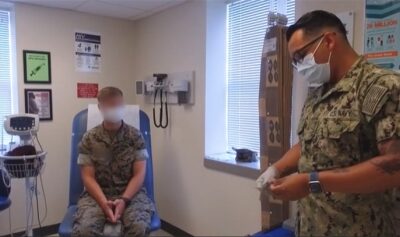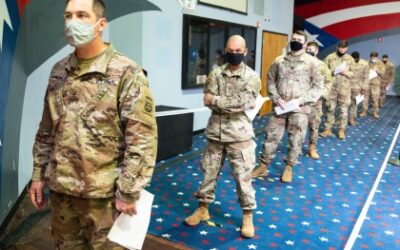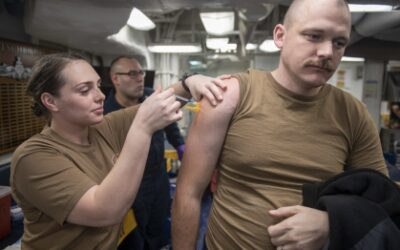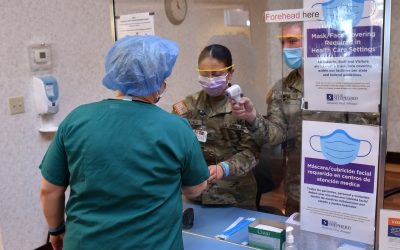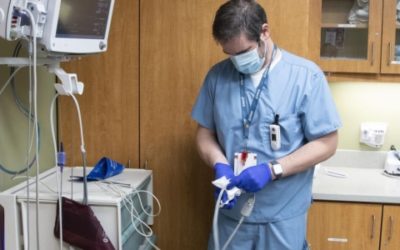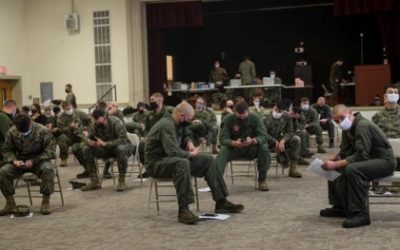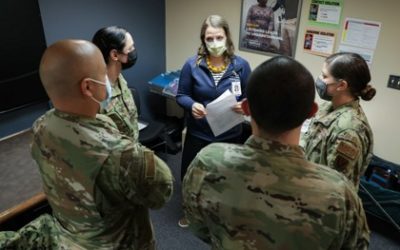DoD officially rescinded the COVID-19 vaccine mandate for servicemembers last month. Even though President Joe Biden and DoD leaders opposed the move
Study Examines Reasons for Vaccine Hesitancy in Patients With IBD
Even after years of the COVID-19 pandemic, data remains somewhat limited on the safety profile of SARS-CoV-2 vaccine in patients taking immunosuppressive medications.
COVID-19 Reinfection Adds Significant Risk to Multiple Organ Systems
Despite misconceptions that prior COVID-19 infections can keep patients from having severe cases in the future, a new study suggests that recurrent cases pile on the risk of adverse health conditions in multiple organ systems.
Factors Linked to Severe COVID-19 Among Vaccinated, Hospitalized Veterans
Although vaccination and boosting remain the best defense against COVID-19, breakthrough infections among those vaccinated and boosted are exceedingly common.
Polypharmacy Associated With Worse Outcomes in Veterans With HIV
The good news, according to a recent study, is that medical intensive care unit (MICU) admissions have been declining in people with HIV infection (PWH).
Degree of Diastolic Dysfunction Similar With and Without HIV
Human immunodeficiency virus (HIV) infection is known to be associated with subclinical cardiomyopathy, diastolic dysfunction and increased risk of cardiovascular death.
HIV Prevention Use Remains Too Low in U.S. Military
Even though about 20.9% of U.S. servicemembers report a high risk of HIV infection, only about 2,000 of them had accessed HIV pre-exposure prophylaxis (PrEP), as of 2017.
Severe COVID-19 Illness Low for Veterans After Vaccination Plus Booster
Veteran patients who received a COVID-19 vaccination series, plus a booster vaccine dose, had a low incidence of hospitalization, death or severe illness from COVID-19, according to a new study.
DHA: Chlamydia Is the Most Common Sexually Transmitted Infection Among Active Duty U.S. Military Servicemembers
Chlamydia is the U.S. military’s most common sexually transmitted infection (STI) among active duty servicemembers, according to 2021 and 2022 reports on STIs by the Defense Health Agency’s Armed Forces Health Surveillance Division.
VA Receives First Doses of Vaccine to Help Combat Monkeypox Outbreak
When the World Health Organization declared monkeypox a public health emergency on July 23, there were more than 4,000 reported cases in the United States. By mid-September, the number of reported U.S. cases had surpassed 24,000.
Clostridioides Difficile Infection Increases Mortality, Costs for MHS Patients
One of the largest studies ever of healthcare-facility-associated Clostridioides difficile infection (CDI) underscored the seriousness of the infection, which causes significantly increased length of stay, higher costs, and, worst of all, greater mortality among inpatients.
Blood Sugars Higher for Flu Vaccine Recipients With Diabetes
The Vaccine Adverse Effect Reporting System, established by the national Centers for Disease Control and Prevention, has more than 350 reports of hyperglycemia post-influenza vaccine, according to a new study.
Elderly Veterans More Likely to Die from COVID-19 Than Flu
An often repeated misconception during the COVID-19 pandemic is that the Sars-C0V-2 and influenza viruses are similarly fatal for older adults, although there have been limited data to support that observation.
Yellow Fever Vaccine Response Lower After Flu Vaccine
The DoD’s support of the United States government’s response to the Ebola crisis in Liberia, beginning in 2014‐2015, was the first U.S. military operation to support a disease‐driven foreign humanitarian assistance mission.
Clonal Hematopoiesis Does Not Predict Severe COVID-19
COVID-19 cases range dramatically from severity, from asymptomatic to self-limited influenza-like illness to severe respiratory failure or even death.
Despite Allergic-Type Reactions, Military Study Found Many Patients Can Tolerate Second Dose of COVID-19 mRNA Vaccine
Although serious allergic reactions to mRNA vaccines are extremely rare, fear of them has driven hesitancy among some potential recipients. That especially has been the case when an adverse effect occurred after the first dose.
MHS Researchers Found Current Antibiotic Dosing Guidelines Adequate for Critically Ill Patients With Trauma, Burn
Critical illness caused by burn and sepsis doesn’t alter how the body processes piperacillin and tazobactam (pip-tazo), an antibiotic and beta-lactamase inhibitor drug combination
Low VHA COVID-19 Booster Rates Leave Veterans Vulnerable to Severe Cases
President Joe Biden, despite being 79 years old, had a mild case of COVID-19. The primary explanation for why he escaped severe symptoms is that he was not only vaccinated, but double-boosted.
‘Pan-Coronavirus’ Vaccine Developed by Army Research Shows Promise
Based on recent preclinical study results, the Spike Ferritin Nanoparticle (SpFN) COVID-19 vaccine is showing significant promise.
National Guard Pandemic Response Proves Motto ‘Always Ready, Always There’
For more than two years, the National Guard has risen to the challenges posed by COVID-19 as the pandemic has disrupted lives, supply chains, health care, education and more.
VA Studies Continue to Demonstrate High COVID-19 Vaccine Effectiveness
From the time the COVID-19 mRNA vaccines became available in late 2020, VA studies have been crucial to understanding their effectiveness in real life.
Ann Arbor VAMC Rapidly Stands Up Monoclonal Antibody Treatment Service
As emergency departments around the country struggled to get through the day during the recurrent surges of the COVID-19 pandemic, the emergency medicine team at the LTC Charles S. Kettles VAMC here did something extraordinary—they sought out more patients to treat.
Shingles Vaccination Rates Struggle to Improve at VA
Efforts to promote use of a vaccine against herpes zoster, commonly called shingles, have been fraught with difficulty.
How Deployed Military Personnel Viewed COVID-19 Vaccination
To better understand vaccine hesitancy related to COVID-19 shots, a study recently looked at how likely deployed military personnel is to be vaccinated.
Receipt of Multiple Vaccines Lessens Dementia Risk
Are older adults who receive both herpes zoster (HZ) and a tetanus, diphtheria, pertussis (Tdap) vaccine less likely to experience cognitive issues than seniors who receive only one or the other vaccine?
Moderna COVID-19 Vaccine Proves More Effective Than Similar Pfizer Product
While both of the messenger RNA vaccines used in the United States work very well, a new VA study found that, in a head-to-head comparison, the Moderna product is more effective than the Pfizer-BioNTech product.
VA Seeks to Change Initial Concerns About COVID-19 Vaccines Into Acceptance
Early in 2021, more than one-fourth of veterans responding to a survey said they were concerned about getting a COVID-19 vaccine. The VA has worked steadily since then to change their minds.
Military Begins Discharges of Servicemembers Refusing COVID-19 Vaccines
Most active-duty U.S. servicemembers had been vaccinated against COVID-19 by mid-December, when the Army set its deadline.
Which Cancer Patients Get Most Protection From COVID-19 Vaccines?
With new variants popping up and steady occurrence of breakthrough infections, the question of the effectiveness of SARS-CoV-2 vaccination in patients with cancer has not really been answered until now.
DoD Will Provide Medical Workers to Help Civilian Hospitals Fight Omicron
In response to the surge of COVID-19 cases related to the omicron variant, President Joe Biden said that an additional 1,000 military medical personnel would be available to aid civilian hospitals in the United States by early this year.

